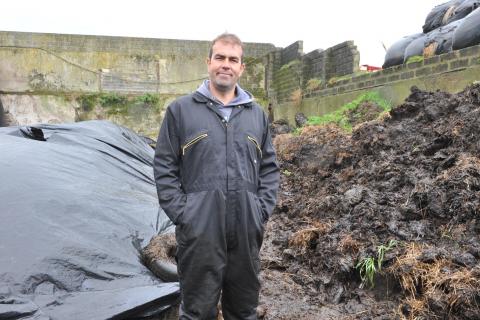Covering a heap of farmyard manure with sheeting and turning it regularly has been shown to double its potash value and significantly increase phosphorous levels during a Farming Connect trial at a Pembrokeshire organic farm.
The Miles family – Gerald and Ann and their son, Cazz - use composted manure from their herd of Welsh Black cattle to grow cereals and vegetables at Caerhys, near St Davids.
Until this year they had stored manure uncovered and there were no interventions until it was spread on the land.
The family was keen to establish if nutrient values could be enhanced if the manure was treated differently and participated in a trial through their work as a Farming Connect Focus Farm.
With advice from ADAS horticulture specialist, Chris Creed, the manure was covered with plastic sheeting and the heap turned every month; a second heap of manure acted as a control.
Covering manure prevents leaching of valuable nutrients and reduces nitrogen losses from gaseous ammonia. Turning the heap causes it to heat to a higher, more even temperature throughout.
Introducing oxygen enhances microbial activity which breaks down the particle size of the manure, rendering nutrients more available in the soil.
The ideal temperature is 60 degrees C as it will kill weeds and most pathogens.
The results of the trial, which were presented to farmers during a Farming Connect open day at Caerhys, showed that not only was the potash value in the covered heap double that of the control – 5.99kg/tonne/freshweight compared to 2.73kg – but the phosphorous was much higher too, at 3.71kg compared to 2.8kg.
The magnesium value was also greater, at 1.9kg/tonne/freshweight compared to 1.49kg.
Enhancing the nutrients in manure is of benefit to all farmers, regardless of their system, says Mr Creed.
“It means there are more nutrients in each tonne of manure so a smaller quantity can be used on a larger area. This has particular implications for farms in Nitrate Vulnerable Zones which are limited on the volume of manure they can apply to their land.’’
Nutrients are also more rapidly available to crops. “The aim is to produce a friable humus that when applied provides additional benefits to the soil,’’ says Mr Creed.
By analysing the compost, farmers can apply it at the correct rate for the crop being grown.
“Farmers always spread manure at 10 tonnes an acre and then find they have run out,’’ says Gerald Miles. “By taking time and a little effort to manage the manure we can produce good manure that will cover a far greater area on the farm.
“I think composted manure is the most valuable by-product of farming and it is an asset we should all really manage better to fertilise our farms.’’
At Caerhys, the manure is used in the production of heritage varieties of corn and also vegetables grown for a Community Supported Agriculture (CSA) boxed vegetable scheme.
CSA allows people to have direct access to high quality fresh produce grown locally by farmers.
A Farming Connect Nutrient Management Plan provided soil analysis of the growing areas and poly tunnels at Caerhys and showed that some have a potash and phosphorous index of 3, equivalent to the values more commonly associated with high input systems.
“It is tremendous to see these levels on an organic farm and it demonstrates what is possible in a self-contained system,’’ says Mr Creed.
The open day at Caerhys was facilitated by Dr Delana Davies, Arable and Horticulture Technical Officer at Farming Connect.
Dr Davies said the project had demonstrated that attention to detail in dealing with a commonly available waste product on farm can deliver a very valuable commodity that will enhance self-sufficiency on many holdings.

